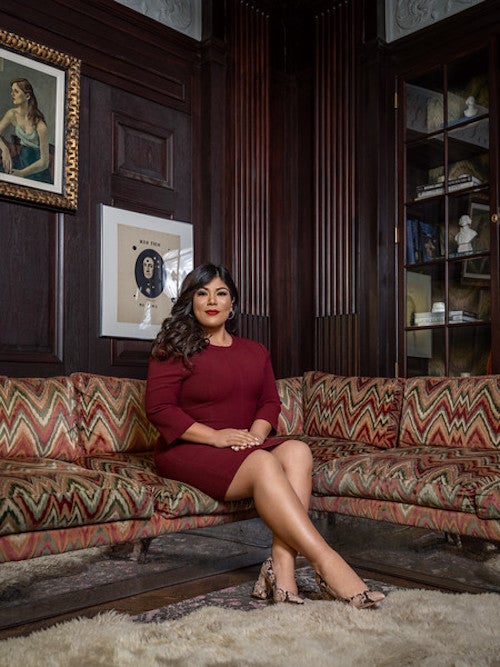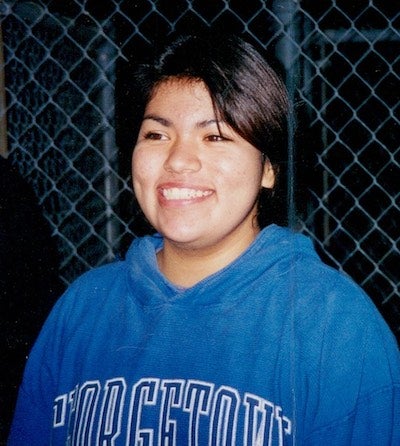GU Health Systems Administration Alumna, Mentorship Entrepreneur Joins School Advisory Board
June 17, 2021 – When Georgetown alumna Vanessa Villaverde (G’17) describes her educational and career path, she gratefully points to individuals who have provided encouragement, mentorship, and support along the way.
Villaverde, who received an executive master’s degree in health systems administration at the School of Nursing & Health Studies, co-founded the new company Menther LLC, an effort to give back and to help create opportunities for others.

“I’m excited about this next stage of my life because it’s the first company I have co-founded,” said Villaverde, who has joined the NHS Board of Advisors. “Menther is a company that is using tech in the empowerment of women. It is very much tied to my own story.”
Forming a Connection
Villaverde was born in Brownsville, Texas, which she recalled was “the poorest neighborhood at that time in the country.” She first encountered the name Georgetown while shopping at a local Goodwill when she bought a sweatshirt, one she remembers always wearing following school tennis tournaments.
When she was 17, she attended Amherst College with the aspiration of becoming a physician. “The delta between the sort of education you get in a low-income school and a place like Amherst was frankly too large for me to bridge, even with tutors, even spending every summer working extra, especially because I had to have a job while I was doing that,” she said.
Her focus shifted to health care law, and she received her bachelor’s degree in the area of law, jurisprudence, and social thought. Villaverde then returned to Texas for graduate school, earning a master’s degree in public affairs.
“The number one issue I care about is making sure that there is a pathway of opportunity for women like me, that younger woman that I was, to actually find a connection,” Villaverde said about her new company’s mission. “So much of my story happened because people picked me, they sponsored me, they mentored me.”
Focus on Innovation
“But what happens to all those people that don’t get picked or they don’t get mentored or they don’t even know who to meet to create that opportunity,” Villaverde asked – framing the critical question that inspires her work. Menther’s technology, she noted, allows individuals to connect with personal and professional mentorship regardless of zip code.
Following her first graduate degree, Villaverde worked in the Bush administration to help with the roll out of the Medicare Prescription Drug, Improvement, and Modernization Act (Part D), specifically with communications among Spanish-speaking communities in the Southwest.
“I got to know the patients that were impacted most by the changes that Part D would bring throughout the Southwest and had a wonderful career for a decade at CMS,” she said.
Georgetown’s Program
While completing Georgetown’s program, she was working for the Blue Cross Blue Shield Association, leading federal program policy for three dozen plans around the United States.
Her longtime mentor, Georgetown adjunct associate professor Linda Fischetti, had encouraged her to apply so that she could learn to apply her “systems-thinking approach from policy creation to problem-solving the operational challenges of health care today.”
“The [master’s] program gave me the confidence to go out and be a problem-solver within venture-backed health tech startups, forward-facing organizations that are a lot more cutting-edge by their design,” said Villaverde, who enjoys creating opportunities for patients, payers, and providers to ideate and innovate together.

Breaking Down Silos
“Health care is one of those domain areas that is extremely siloed,” she said. “Your key stakeholders [payers, providers, and patients] never really get to talk to each other in a normal setting unless that setting is actively created for the purpose of change.”
Villaverde hopes her new position on the board will enable her to share her enthusiasm for the opportunities of startup creation with current health systems administration students.
She says she hopes to achieve this “by continuing to create these intersections of stakeholders to ideate with graduate students and sharpen their own abilities to design solutions.”
“In today’s world, health care startups are not predominantly founded by those with the most domain knowledge,” she said. “I’m really excited about the potential to change that and to make sure that the health system students know that they have options to actually start companies and leverage both their design thinking alongside business acumen and capital to build solutions and to be innovative.”
Lifelong Learning
Villaverde, as an adult learner with a family, hopes society becomes more supportive of women in their pursuit of education and advancement regardless of where they are in their lives.
“I was just having this discussion yesterday with another working mother and founder,” she said during an interview earlier this week. “We need to become more supportive as a society of our women who have families and ensure they can continue to learn – because lifelong learning is the way you build a healthy career over time.”
About her own story, Villaverde said, “I’m a lifelong learner with three children, and they were completely supportive, but none of it would have been possible without the help of my network helping me throughout the process. Now I’m excited to do that for other working mothers as well.”
By Bill Cessato
